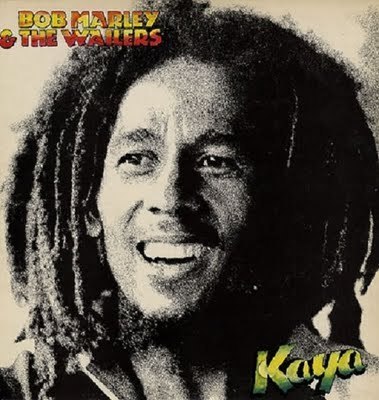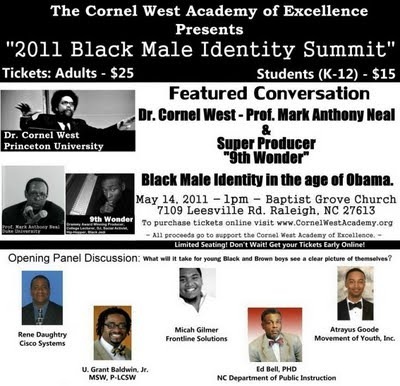Mark Anthony Neal's Blog, page 1086
May 16, 2011
Our World with Marc Lamont Hill: Gender Justice
Marc Lamont Hill is joined by Salamishah Tillet, Byron Hurt and Akiba Solomon.
Published on May 16, 2011 08:30
Complex-ED: The Secret Relationship Between the Music and Prison Industries.
A film by Real Talk Media featuring Professor Jared Ball
Published on May 16, 2011 08:22
May 15, 2011
May 14, 2011
The Lonely Londoners: A Musical Essay on the 1981 Brixton Riots

The Lonely Londoners: A Musical Essay on the 1981 Brixton Riots by Lynnee Denise
Drum and Bass is Black Music...
On the 30th anniversary of the 1981 Brixton riots (April 11 2011), a historic reaction to the violent and xenophobic environment that informed the policing of African and Caribbean immigrants, I examined the ruthless desire to "Keep Britain White." I read Sam Selvon's 1956 novel "The Lonely Londoners," which tells the story of the Caribbean community's communal response to the English brand of white supremacy and their cultural preservation as a means for survival and sought the political, social, and musicological context of a sound that takes root in Sly and Robbie's genre of Reggae Music—Drum and Bass. Inspired by these histories, I've created a musical essay that epitomizes my long-term relationship with Black Britain and the parallel strategies of resistance that Black Americans have employed to attain basic human rights. Shout out to drum and bass pioneers Roni Size, Goldie, LTJ Bukem, Kemistry and Storm, Krust, and all the other sons and daughters of "The Lonely Londoners."
I'm excited to introduce a new series of liner notes. As a part of the WildSeed Cultural Group Independent Artist in Residence program in Atlanta, Georgia (2011-2012), I will be working with my favorite thinkers, writers, cultural critics and scholars to help contextualize my mixes. The first to launch the series is Esther Armah, a fierce Black British writer, speaker, moderator and leader in the emotional justice movement. Thank you Esther for being willing to participate in this project and for helping to make "Entertainment with a Thesis" a reality.
Liner Notes by Esther Armah*
We made it. Not bodies. They were battered, bruised, brutalized, buried. The drum beat landed. Intact. Slipped unnoticed between bodies, souls, minds carried from West Africa's shores via the West Indies. Landed unbent and unbroken in this new land - West London. We were the language left when mother tongue was dragged screaming from its source, we were the unshed tears of the middle passage. Company came. Sought us out. Hands grabbed at us from Empire Wind-rush bodies, carried to this place from Caribbean islands. A new language, new accent from this new nation called England. Black backs bent and shaped by British labor, sweat collected from a generation invited and despised in the same breath. Our mamas and daddies, silent and deadly. That racism DNA pounded and flattened, birthed into frustrated beats and a new generation. Defiance became the breath of those born to these Caribbean bodies mangled seeking refuge from racist rants. This was now Black Britain. Sound changed. Started to gather new notes from new generation. April 1981. Brixton streets, injustice exploded, caught fire, consumed and cleansed.
Remnants of those unshed tears from that middle passage put the fire out on the streets, left it burning within Black Britain. Fragments of rage wrapped in that drum, dirt from boots pounding those streets caught between notes. Fragments, pieces, floated, landed. Sound from snatched pieces of leftover 1960s signs that screamed: 'No Niggers, No Dogs, No Irish', sound dragged from police officers' brutal batons before they rained rage on nappy heads, sound from untold injustice - all fashioned into language. Called it bass. The sound from an unwelcome land. The double consciousness in the mirror whose reflection you couldn't see. Mangled beauty drenched in righteous rage. Drum n bass. 30 years on from Brixton; bodies, boots, batons echo, haunt, haint. Now. Press play.
Published on May 14, 2011 15:06
The Wonder Year: Inspiring Soul with 9th Wonder

Busted Headphones The Wonder Year: Inspiring Soul with 9th Wonder by Quentin B. Huff | Popmatters
The Elusive Middle Ground
9th Wonder does not subscribe to these divisions. He sees it happening between generations, not just in terms of how musical tastes create age-related rifts but also in the effects of polarizing opinions about hip-hop. When he talks about the generation gap where music is concerned, you can almost feel his profound love for all music that comes from the soul.
"I have so much respect for the '70s and the '60s," he said, "because of my love for James Brown. If I'm listening to Edwin Starr and George Duke, not only do I want to listen to them, I'm thinking about how they lived. What was it like to be in the '70s? That's the connection that we can preach. And that's the thing about the generational divide. I think hip-hop can really change that to make both a kid and an adult understand [one another]. I look at most concerts on TV, a Mötley Crüe concert, you'll see a granddad or a dad and a son. At a Rolling Stones concert, you'll see a granddad, a son, and a 14-year-old, all watching Mick Jagger. Why can't we have that for A Tribe Called Quest, man? Only a few people in our culture we can do that with. And there needs to be more."
Not only does his ability to find the elusive middle ground inform his beat-making and his historical perspective, it also impacts the way he markets his music. "You got some people that's stuck in the new and stuck in the old. The people that's stuck in the old, 'Man, I don't do Twitter. Man, I don't do that. I don't do Facebook. I don't be on none of that stuff.' You don't wanna sell no records then, friend! Like, in this day and time, you don't want NO buzz. 'Cause you're tryin' to reach the audience that can buy the records the most, and that's them 14 through 18s. And if you want to sell anything to them, you gotta get on that Twitter, man. But then you got ones, the new kids, who are like, 'I don't wanna meet people' and 'I don't wanna talk to people' and 'I wanna meet everybody through the internet.' Naw, you gotta get out and talk to people, you gotta do in-stores, you gotta do interviews, ya know. That stuff still works."
Some of that "middle ground" mentality emanates from his upbringing, as a child of the '70s. "I was blessed to be born when I was born, 1975," he explained, "because we had the old school way of life, and we were young enough just when things started to change. We were lucky enough to understand both sides."
Of course, the gravity of having a documentary about oneself, and screening it in one's hometown was not lost on 9th Wonder. It was a moving experience, one that could not be compartmentalized in that middle ground. His children were in attendance, along with all manner of fans, friends, colleagues, and extended family.
Read More @ Popmatters
Published on May 14, 2011 04:41
May 13, 2011
Cullen Jones; 9 Months and 22.24 Seconds Later, Roster Spot Is Won

9 Months and 22.24 Seconds Later, Roster Spot Is Won by Viv Bernstein | New York Times
CHARLOTTE, N.C. — After nine months of training and more than a little tension between teammates and friends, the final spot on the United States swim team came down to a 50-meter freestyle sprint Thursday at Mecklenburg County Aquatic Center. When it was over, Cullen Jones barely held off Josh Schneider to earn the berth for the world championships in July in Shanghai.
Jones beat Schneider by four-hundredths of a second, winning in 22.24 seconds.
"I know a lot of people built it up like two boxers, and I think we definitely went at it like that," said Jones, 27, a gold medalist in Beijing in 2008. "But at the same time, we're friends. We definitely train well together.
Published on May 13, 2011 14:18
May 11, 2011
Marley in Love
 Marley in Loveby Mark Anthony Neal | Popmatters (Reprint)
Marley in Loveby Mark Anthony Neal | Popmatters (Reprint)Sandwiched in between two "great" Marley recordings, it has perhaps been easy to ignore -- forget really -- the significance of Bob Marley's 1978 recording Kaya. Exodus (1977) was a commercial success largely on the strength of "Jammin'," which became the song most synonymous with commercial audiences in the post-Bunny Wailer/Peter Tosh era. By the time of Survival's release in 1979, Marley was ready to trade on his commercial viability to openly address some of the political realities of the time. With tracks such as "Zimbabwe," "Africa Unite," and "Ambush in the Night," Marley injected his voice into the myriad of voices addressing the fall of Rhodesia, the need for stronger diasporic ties among African peoples, and the continuing brutality of military forces in his native Jamaica.
Marley was perhaps simply finding some quiet time with Kaya -- a chance to recover from assassination attempts, the pressures of balancing his "righteousness" with his growing iconical status and the realities of always (quick shout to Duke Ellington) being on the road. Kaya finds Marley in love -- in love with a thick stiff spliff, some bright mornings, and that lil' brown gal 'round the way."Excuse me while I light my spliff" and thus are the opening lines of "Easy Skanking," the track that opens Kaya. A little more low key than the "Spliff" that adorned the original cover are of the now classic Catch a Fire, the line fully captures the mood of the recording. Kaya is of course the "ganja" plant and there is a picture of one that adorns the backing cover-art. Throughout Kaya, Marley is personal, unguarded, playful, full of joy in ways that had not been present in his earlier work as he sings "Got to have kaya now, got to have kaya now," registering a pre-hip-hop take on "puff, puff, pass" etiquette.
Marley is equally lighthearted on the spookish "Sun is Shining" where he sings "Sun is shining, the weather is sweet / Make you want to move, your dancing feet / To the rescue, here I am." Marley's cavalier attitude (how do you say carpe-diem in Jamaican patois?) is ever so evident towards the end of the song as he warbles "scoo-be-doop-scoop-scoop." The song is built around the seven-day week and Marley pleads his case, singing "When the morning gathers the rainbow / Want you to know, I am a rainbow too" and proving that even the crown-prince of "reggaemusic" (think about how Marley himself used to say the phrase) ain't above getting' on his knees and doin' a Keith Sweat like mack.
And plead he does. About half of Kaya centers around that "lil brown gal." Two of the most memorable tracks from Kaya are the tracks that sing her praises. On "Satisfy My Soul," Marley flirtingly sings "When I meet you around the corner / You make me feel like a sweepstakes winna (winner)" later changing up the lyrics with a much more urgent and lustful "when I met you around the corner / Oh I said baby, never let me be a loner." On the brilliantly simplistic "Is This Love?" (to this day still my favorite Marley song of all time) Marley can barely contain himself as he yelps in the opening lyric "I wanna love ya, and treat you right." Marley sings about making a life together with lyrics like "we'll share the shelter, of my single bed / We'll share the same room, JAH provide the bread" recalling DJ Rogers' oh so underrated soul classic "Say You Love Me".
Given the Marley canon, which includes so many lyrical firebombs aimed at the great global "isms" of the modern era--neocolonialism, imperialism, racism and capitalism (modern men didn't seem, much interested in sexism), both "Satisfy My Soul" and "Is This Love?" are so powerful because Marley allowed himself to be "caught up" in such an unguarded mood, leaving himself vulnerable to the inconsistent rhythms of love. Marley's vulnerability is made more apparent on tracks such as "She's Gone," "Misty Morning" and the haunting "Running Away." On the latter track Marley speaks from the position of a man in flight ("You running and you running / But you can't run from yourself.") The last two minutes of the song is brilliant as Marley sings in a growly whisper -- no doubt a ganga induced stream of improvisation -- repeating several times the line "I'm not running away." The moment is every bit as striking as the gospel-induced drives that close so many classic gospel recordings.
The most blatantly political track on Kaya, the acoustically sparse "Time Will Time," features one of Marley's most moving post-Bunny/Peter performances as Marley defiantly sings "JAH would never give the power to a baldhead / run come crucify the dred". More than 30 years after its initial release in March of 1978, Kaya remains a sweet satisfying surprise from Marley.
Published on May 11, 2011 19:14
"Common' A Controversial Rapper? James Braxton Peterson Responds to 'Fox News' Madness
Watch the latest video at <a href="http://video.foxnews.com"&am...
Watch the latest video at <a href="http://video.foxnews.com"&am...
James Braxton Peterson is Associate Professor of English at Bucknell University and the author of the forthcoming Major Figures: Literary Approaches to Hip Hop Culture (University Press of Mississippi).
Watch the latest video at <a href="http://video.foxnews.com"&am...
James Braxton Peterson is Associate Professor of English at Bucknell University and the author of the forthcoming Major Figures: Literary Approaches to Hip Hop Culture (University Press of Mississippi).
Published on May 11, 2011 05:19
May 10, 2011
'Black Male Identity in the Age of Obama' feat. Cornel West, 9th Wonder & Mark Anthony Neal
Published on May 10, 2011 13:55
Mark Anthony Neal's Blog
- Mark Anthony Neal's profile
- 30 followers
Mark Anthony Neal isn't a Goodreads Author
(yet),
but they
do have a blog,
so here are some recent posts imported from
their feed.




